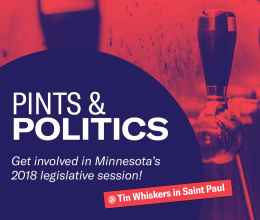
With the 2018 legislative session starting February 20, we know you have lots of questions about what to anticipate over the next three months. Communicating with your state legislators is easier than you think—and it’s fundamental to democracy. In this blog, we answer your questions about how to talk to your Minnesota legislators so that they will listen!
How do I know who my legislators are?
If you don’t know who your state legislators are, no worries—it’s easy to find out! Visit https://www.gis.leg.mn/iMaps/districts and enter your address to find the names of your state legislators and their contact information.
We recommend writing down the (1) name, (2) address, (3) e-mail, and (4) phone number of your legislators and keeping it somewhere easily accessible. You never know when you might need to quickly call your legislator or send a quick message!
What does it mean to lobby and how can I do it?
“Lobbying” is just jargon for meeting with an elected official to discuss a specific bill or issue. Scheduling a meeting with your elected official can be intimidating—but it doesn’t have to be!
- Request your meeting. Give specific dates/times for the meeting, as well as a brief description of the issue or bill that you want to discuss. If your legislator is not available, they may schedule an appointment with their staffer. Staffers can be just as important to the process as your elected official, so it’s great to build relationships with them, as well.
- Do your research. Check the ACLU website for information on our key legislative issues, as well as talking points. Know your legislator’s voting record and/or opinions on the issue or bill you will be discussing. If you decide to leave materials with your legislator or their staffer, make sure that you are providing them with helpful, useful, and concise materials.
- Identify your ask. Do you want your legislator to vote for a bill? Schedule a hearing? Commit to introducing or co-sponsoring certain legislation? Decide what you want from your meeting and make sure to ask for it—but make sure your expectations are in line with what that legislator is actually able to do.
- Keep the meeting concise but personal. You will have 20 minutes or less for your meeting—so be punctual and considerate of their time. Practice what you want to say and stick to your talking points. Share brief personal anecdotes and local examples of how the issue or legislation impacts you and/or your district specifically.
- Follow-up! Send a timely follow up thanking your legislator for meeting with you and closing any necessary loops. You should definitely express your disappointment if your legislator does not follow through with your ask—but also don’t forget to thank your legislators when they do follow through!
What are other ways I can communicate with my legislator?
Meetings are the most effective way to talk to your legislator, but it’s not the only way! You can also call and speak to a staffer to let them know your opinion on specific legislation or issues. Typically, staffers will write down the information and convey the message to your legislator.
If you are sending an e-mail or letter, it is best to make the message personalized. Be clear that you are a constituent—your elected officials want to hear most from the people that they represent! The same rules apply—be concise and clear in your communications. Less is more!
Can I use social media to talk to my legislators?
Following your legislators on social media is a great way to be informed about what your legislator is doing! You can also use social media to engage and talk to your legislators. But before you start tweeting at your legislators, it’s important to know how social media is different from the other forms of communication we have discussed.
Elected officials do not lose their First Amendment rights simply by gaining public office. Whether a public official is using social media as a government actor, rather than as a private speaker, can be a complicated legal question. Generally speaking, if your legislator intentionally designates a social media page a space for public conversation or interaction, either through their social media policies or how they use the account, courts have considered these social media accounts to be a type of public forum where individuals’ First Amendment rights are protected.
If a public official is using social media as a government actor, the First Amendment dictates that they cannot block you based on views expressed in public conversation or restrict your access to their profile based solely on your viewpoints. Regardless of whether your elected official is using their social media account as a private or government actor, hate speech and threats are not protected under the First Amendment.
If your elected official has blocked or restricted your access to a social media account AND that account is being used to communicate with the public as a government official, contact the ACLU-MN at https://www.aclu-mn.org/en/request-assistance.
What are other ways I can get involved?
Check the Minnesota Legislature calendar for public hearings. The calendar will note if they are accepting public testifiers and will outline details about scheduling. You can also check your legislator’s page for upcoming Town Hall meetings taking place in your district and sign-up for their e-mail updates to be informed about upcoming events.
Next week, we’ll be posting about the ACLU-MN”s legislative priorities and how you can stay up-to-date on the issues that we care about. And learn about our upcoming events to help you get involved in this year’s legislative session!
